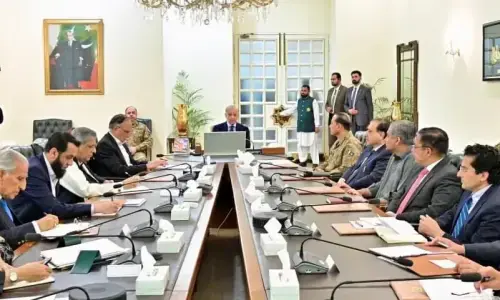OUR society seems to have been obsessed for long with the idea of matrimony. Mercifully, the growing trend towards female education has to an extent weakened this obsession — but not in communities still deprived of the benefits of education and enlightenment.
In these underprivileged classes, which constitute the majority, it is a common practice for mothers to start planning their child’s marriage soon after birth. They informally decide who will be whose life partner. Termed ‘baat pukki karna’, the arrangement is irrevocable. The girl’s mother even starts collecting her daughter’s jahez. Obscurantist parents even consider it a sin if the child is not married before puberty.
These ridiculous beliefs that shape society’s thinking also harm the country as they lead to a higher population growth rate, an increased infant mortality rate and poor reproductive health of women. The WHO has issued numerous edicts that identify the ill effects of early marriages and childbirth on the health of the mother and her child.
Read: Child marriage complexities
No doubt the government in Sindh took heed of these warnings and in 2013 the Sindh provincial assembly adopted the Child Marriage Restraint Act that banned the marriage of girls and boys under 18. But as is the wont in Pakistan, this piece of legislation was ignored and no effort was made to implement it. The other provinces have not even adopted a law restraining child marriage.
It has been left to civil society to prevent underage marriage.
In these circumstances, it was left to civil society to take up the challenge and rescue little children from the grip of social criminals, mainly conservative parents who destroy their own offspring’s lives. It is creditable that the Legal Aid Society (LAS) decided to take the initiative and launched an evidence-based project called the Child Early Forced Marriage Project (CEFMP) in September 2021. It has previously taken up other programmes for the benefit of women and one hopes it will succeed by virtue of its focused strategy and past experience.
Read: View from the courtroom — Child marriages go unchecked as govt delays new legislation
With the UNFPA as a partner, CEFMP aims to create a legal framework for the issue, build capacity among those who are involved in the implementation of the Act, raise awareness in the community and propose evidence-based reforms that are accepted by cross-party consensus.
This entails sensitising the ‘actors’ such as judges/ magistrates, parliamentarians, nikah registrars, police, etc and disseminating information about the harms of childhood marriage and amending the existing laws and procedures accordingly. Some of these should be easy to do, given the resources available. LAS has already undertaken projects such as airing radio programmes conveying the required messages and training various cadres of government functionaries.
The real challenge is to change the mindset of the community and also the individuals representing the government who are crucial in the implementation of the reforms.
LAS itself admits that a large number of the 57 nikahkhwans identified in the three districts selected for the project were unwilling to even attend the training workshops for lack of resources and did not even consider child marriage a social crime as according to them there was nothing wrong with it. As for the conversation circles LAS has been holding with communities, their success would depend on the extent of engagement of the participants, the credibility of the leaders of the circles and their approach and frequency of meetings. Similar efforts to mobilise the people for family planning and women’s rights have generally failed.
LAS recognises that motherhood is a natural process that is much respected and that elevates the status of women in the family. But it insists that marriage and motherhood need to be regulated by law to oblige parents not to marry their children before they cross 18 years, the age of legal majority.
However, LAS faces heavy odds because there are powerful vested interests opposed to any social change. They include religious leaders, nikahkhwans and the police who resist change.
In Pakistan, the problem is of a serious magnitude on account of the additional problem of lack of documentation of data and events in a person’s life. Thus it is said that nearly two-thirds of births and marriages are not registered with any authority and Nadra has no record of them. The biggest impediment is bureaucratic tardiness and resistance from religious elements.
Take the case of the draft of a revised nikahnama lying before the Council of Islamic Ideology since 2019 awaiting clearance. Without a new nikahnama the marriage law cannot be made really effective.
Hence LAS would do well to broaden its goals to include in its strategy a focus on other social issues such as education and family planning as well. This will empower women. It is well known that educated women who do not have many children and hold a job that gives them self-esteem have confidence and bring up their children with the same outlook.
Published in Dawn, December 17th, 2021
































